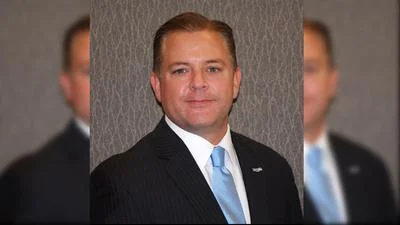The $1 million in salary cuts announced in Will County's fiscal 2018 budget will not mean individual pay cuts for county employees, a board member said during a recent interview.
In fact, there could be new employees at the jail, Will County Board member Mike Fricilone told the Will County Gazette during a telephone interview.
"We're actually cutting salary lines in the budget, which doesn't mean individual salaries are being cut," Fricilone said. "What it means is that that is the amount of salary money that the departments have. So they may have to have less people, maybe they'll have to have some vacancies that they haven't filled in a while, and we're saying, 'If you haven't filled them, you don't need them', then we eliminate the money for that vacancy. So in actuality, we're not reducing salaries, we're reducing the salary money to the individual departments."

Will County Board member Mike Fricilone
Cutting actual salaries wasn't proposed in the budget passed earlier this month, and that would be fraught with difficulties anyway, Fricilone said. "We're not telling them to cut individual salaries," he said. "In many cases these are union workers under a contract, (so) their salaries can't be decreased."
Fricilone, a resident of Homer Glen, executive vice president of Midwest Office Interiors in Woodridge and graduate of Knox College in Galesburg, has been representing residents of the county's District 7 since he first was elected to the board in 2012, according to his profile at the county board's website.
During its most recent meeting, Will County Board members passed a $551 million balanced budget for fiscal 2018 that included about $1 million in salary cuts. Will County's fiscal year begins Dec. 1.
The county's budgetary decisions are driven by a desire for good fiscal stewardship, Fricilone said. "What we're trying to do at the county, especially since I've been the chairman of the county board of finance, is to make sure that we are not wasting one dollar of the taxpayers’ money," he said.
"If we can operate more efficiently, if we can operate with more part-timers, if that's the case, then we want to be able to do that," Fricilone said. "And we're not just going to take more money every year just because we can."
Another area cut is in meals and transportation for conferences, according to Fricilone. "We've cut a lot of that fat out," he said.
"There are things that you need to go to, training for all the different jobs, but we've got to stop paying for all of that out of our coffers. For example, the county board does go to a couple of different functions that we need to go to, but we've eliminated transportation. It's going to be up to the individual board member to provide their own transportation to wherever it might be."
One area of savings comes from the state's new Bail Reform Act, bipartisan legislation intended to safely reduce the state's prison population that was signed by the governor in June and set to take effect Jan. 1, Fricilone said. That law is expected to save the county money.
"For example, a minor offender will be released, rather than sit in jail on a weekend," and offenders released per that bond reform would simply appear at their assigned court date, Fricilone said. "By doing this bold reform ... we should eliminate probably up to 100 prisoners a day in our jail. When we do that, we need less food to feed them, we need less linens to be washed, we need less medical supplies for prisoners, we need potentially less people to watch them."
Similar savings are expected at the Sunny Hill Nursing Home, where double-occupancy rooms have switched to single-occupancy, meaning a reduction in food, linens and other expenses, Fricilone said.
Meanwhile, back at the jail, the county board included money for overtime to be paid to employees of the Sheriff's Department, which is a change from previous budgets, Fricilone said. "Every year, the overtime has been under-budgeted for," he said.
"It took me a couple of years to figure out how this system was working, but the county executive would under-budget it. So if we knew we were going to spend $2 million, he would put, maybe, $500,000 in the budget for it and then we'd end up spending the same amount anyway, which had to come out of reserves later. And I said, 'Well, that doesn't make sense for a balanced budget if we already know that we're going to have an expense that we don't budget for.' "
The board also asked the Sheriff's Department to study whether overtime expenses could be cut by adding more people, Fricilone said.






 Alerts Sign-up
Alerts Sign-up